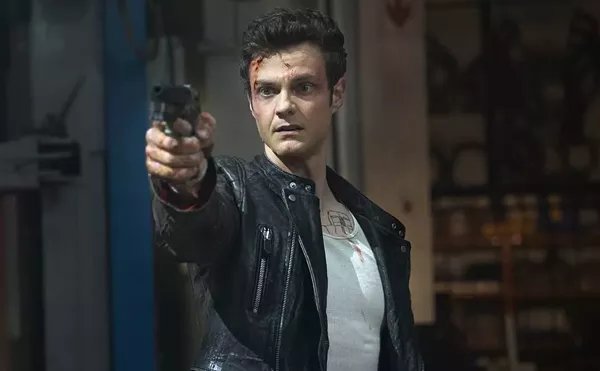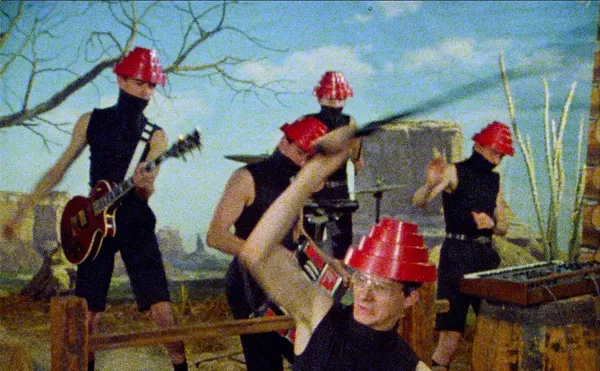It wasn’t long ago that Johnny Depp was pigeonholed as just another pretty face: a teen idol without the depth and talent of peers such as Nicolas Cage or Sean Penn, and with a decidedly eccentric taste in movie roles. But Depp steered his own course and grew into an actor’s actor. You’d have to look back to the 1970s — to Al Pacino or James Caan — to find an actor remotely like him, one who continually takes creative risks while maintaining a bankable marquee name.
“It’s not that I shy away from commercial-type projects,” Johnny Depp explains during an interview in Los Angeles, “it’s just that I think being a movie star would get in the way of being an actor. My favorite actors have always been character actors, and it’s more interesting — and more fun maybe — to at least try and play characters.”
The iconoclastic performer has carved out one of Hollywood’s most enviable and creatively rewarding careers since he leaped from TV heartthrob on “21 Jump Street” to leading man in the John Waters musical Cry-Baby (1990).
The subsequent decade found him moving easily from offbeat mainstream fare (Edward Scissorhands, Don Juan DeMarco) to oddball independent films (Arizona Dream, Dead Man).
So there’s no surprise in his appearance in the Hughes brothers’ phantasmagoric period piece From Hell as Inspector Abberline, a London police officer assigned to the infamous Jack the Ripper case, a character straight out of history, though with some fantastic added twists. Depp, who was already well-versed in the various Ripper theories, finds the one explored in From Hell (the title comes from the return address on a letter from the publicity-courting killer) to be “pretty shocking and pretty important in that world. I think it’s a good one.”
From Hell also finds this self-described fan of biographies again playing a real-life character, which he’s done in films as diverse as Ed Wood, Donnie Brasco and Blow.
“I like playing real-life characters,” Depp explains, “and I like playing characters that you get to invent from the ground up. For instance, Ed Wood was a real guy, but there wasn’t that much material on him — other than footage from his movies — to really be able to tell what he was like as a person. So I had to kind of make it up. When you play a real person, there’s a whole lot more responsibility. Playing George (Jung in Blow), for instance, I felt a deep sense of responsibility. Playing Raoul Duke (Hunter S. Thompson’s alter ego in Fear and Loathing In Las Vegas), it was a really intense sense of responsibility because I was afraid Hunter would sneak up behind me and garrote me, attack me in some way.”
Another recent role, as a Rom (or gypsy) horseman involved with a Jewish singer in Nazi-occupied Paris, strongly affected Depp and demonstrates how his acting choices are inevitably connected to his natural curiosity.
“It’s funny because doing The Man Who Cried,” he says, “to me, the Rom paralleled the Native Americans. What happened ever since Whitey stepped foot on the soil here, it’s been that way for the gypsies over there. It was a great opportunity to meet a lot of those people and become friends and brothers. Each film for me, more than it is a career move or anything like that, it’s an extended education. I take the opportunity to learn stuff and learn things from people.”
The provocative Hughes brothers found a kindred spirit in the adventurous actor. Depp and Allen Hughes concocted a scene where Abberline mixes a potent absinthe-laudanum cocktail to further the character’s hallucinogenic premonitory visions. The brothers also describe Depp’s own mood-enhancing technique: He wears a hidden earpiece while performing, as his own DJ spins an eclectic mix of music from Mozart to the South Park sound track, Miles Davis to Marvin Gaye.
It isn’t just unusual choices and methods that set the 37-year-old apart from most Hollywood leading men: There’s also an ocean. Depp went to France to film Roman Polanski’s The Ninth Gate three years ago and never left. He now lives there with wife Vanessa Paradis (The Girl on the Bridge) and their 2 1/2-year-old daughter. Johnny Depp prefers life away from the American spotlight, and finds he has a particular affinity with European performers.
“Every actor is different,” he says. “Every single one of us is different. We all have the reasons why we do what we do. But I would say, on just a general level, there are a whole lot of American actors who have this disease, the sort of ‘me-me-me-me-me,’ the publicity hounds. ‘How much money can I make? How much more famous can I be?’ And I find that much less in European actors. Their focus is on the work and not so much the result: what that work is going to do for them, how that’s going to further them along. It’s just a dedication to the work itself, and it’s apparent when you see the result.”
Serena Donadoni writes about film for Metro Times. E-mail [email protected]





